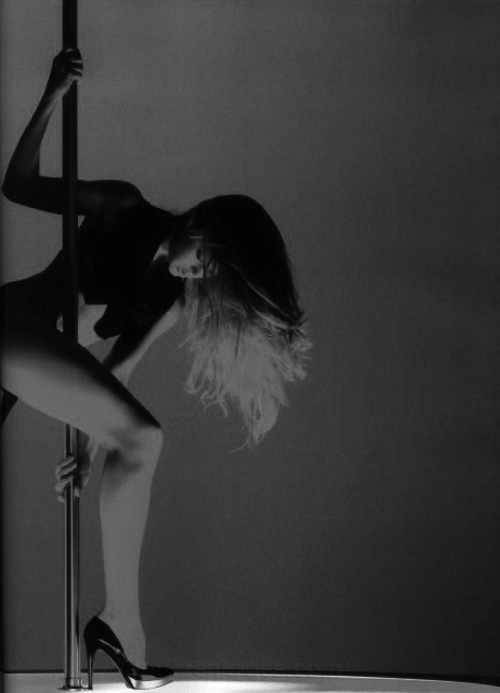
originally published as: Fantasy: Adult Entertainment Exotic Dance by Judith Lynne Hanna, Ph.D. in Bourgeon Volume 3 #2
Since 1995, I have been studying the adult exotic dance industry nationwide. I have observed what happens in and around 133 clubs. I have interviewed dancers, patrons, managers, club owners, lawyers, prosecutors, legislators, judges, local government officials, police officers, community residents and business operators. And I have read the extensive news and literature on exotic dance. On this basis, I offer a few comments.
Exotic dance is a form of dance and art that is about fantasy. Dancers communicate not only erotic fantasy but also such messages as beauty of the natural human body, health and the pretense that clothing confers. Communication is through body movement and disclosure, high heels, closeness between a dancer and patrons, and admiration of patrons.
 Performers say they are savvy entrepreneurs who are empowered, autonomous decision makers who control their bodies and performers with dignity. They want the freedom to manage their own exotic dance business without state interference, police harassment or male dominance. Subject of the gaze, dancers also gaze at patrons for clues as to how they might seduce them in fantasy. Looking and gazing are part of our normal stimulus-seeking behavior.
Performers say they are savvy entrepreneurs who are empowered, autonomous decision makers who control their bodies and performers with dignity. They want the freedom to manage their own exotic dance business without state interference, police harassment or male dominance. Subject of the gaze, dancers also gaze at patrons for clues as to how they might seduce them in fantasy. Looking and gazing are part of our normal stimulus-seeking behavior.
The exotic dancer placing her body within a financial transaction reduces herself to an object, or a commodity, no more than does a professional model, actor or athlete who earns a livelihood using his or her body.
Dancers with problems may not leave them at a club doorstep. As in any type of work, there are well-run clubs and dives, good bosses and bad, polite patrons and rude ones, stresses and pleasures. Creating a theatrical erotic fantasy is no more likely to affect a dancer’s interpersonal relationships than an actress onstage playing a killer. In fact, ex-dancers typically find their club experience applicable to other jobs and life pursuits.
Many misconceptions about exotic dance come from media portrayals, a misinformation campaign by religious moralists, generalizations from single cases, and lack of understanding of nonverbal communication. With applicable laws against crime, sexual harassment and business violations of health standards, exotic dancers and clubs do not need to be singled out for special regulations.
Judith Lynne Hanna (Ph.D., anthropology, Columbia University) is Senior Research Scholar in the Department of Dance, at the University of Maryland, College Park. Dr. Hanna has worked as a dance critic, and an expert witness on court cases related to exotic dance. She can be reached at jlhanna@hotmail.com. “Fantasy:Adult Entertainment Exotic Dance” Copyright 2007, Dr. Judiith Lynne Hanna
Dr. Hanna opines that an exotic dancer reduces herself to an object no more than does a professional model, actor or athlete and that an exotic dancer is no more likely suffer interpersonal problems in relationships than an actress on stage playing a killer. These views are striking to me. Her article, at the very least, raises some thought-provoking points, as does Mr. Bettmann’s reply.
I think there’s a danger is assuming that females in the exotic dance industry are inherently vulnerable. While it’s easy to see them as victims, it’s certainly possible, as Dr. Hanna contends, that most exotic dancers, rather than being degraded and enslaved, are actually skilled professionals exercising control over their bodies and their patrons.
I don’t doubt that money is what draws most exotic dancers to the industry. It’s unfortunate that many women face a lack of alternatives when it comes to finding a job. But even apart from the financial reward, I’m sure many women would still freely choose, for various reasons, to enter the world of adult entertainment.
I share Mr. Bettmann’s concern for establishing a safety net that would prevent the bad bosses and unsavory dives Dr. Hanna admits exist from unfairly exploiting women in this industry. Would singling out exotic dancers and clubs for special regulations achieve this goal? Would changing applicable laws be justified as interfering for the good of the dancers, or is this protective paternalism?
Mr. Bettmann mentions an “exposed risk profile.” Are the risks the same for male and female dancers? I know a former exotic dancer who is male, and to my knowledge, he suffered no emotional or physical abuse during his time as an adult entertainer. Like many of the women in the industry, he was motivated to dance by the promise of lining his pockets with cash. Was he being oppressed and/or objectified? Does his gender make a difference in the dialogue? Aren’t we really talking about the larger issue of the politics of sexuality and power?
This article is actually closely related to the article about male directors of dance organizations. It may be true that male dance directors predominate, but what about independent female dance artists? I think we need to recognize that many, many female dancers, whether exotic, Arabic, modern, or ballet dancers, are actually independent contractors who are technically “self-employed,” as we know from filing our taxes every year. On the positive side, we recognize that this is a form of empowerment for female dancers. We are in control of our own money, we sign contracts for teaching and performance, we deduct the costs of costume, makeup supplies, and automobile depreciation, and we have to find our own methods of dealing with male (and female) dance directors, club owners, choreographers, and private clients. On the negative side, we often find ourselves in umcomfortable situations after the show, when we have to hang around waiting for a check or a cash payment, because what we look at as a normal business transaction, some (especially male) bosses treat as a gift or prize that is in their power to withhold until we flirt with them or appear slavishly grateful enough to deserve a payment. In any case, females who are operating their own businesses as independent contractors should be recognized as having a certain level of power, alongside their male counterparts. It is sometimes true that women have different ways of exerting influence and power that is not the same as a typical man’s method might be, but is equally powerful and influential.
I have great concerns about women in the industry that hs to do with stripping and other such things. While it is possible that some of the women are in the busines of their own accord, there are serious problems because the industry has no controls and many of the women are not in power situations. They have been brought into the industry at the control of others and often end up in unfortunate situations. There have been many articles and issues raised about “the sex industry” and the fact that women are brought into this by men who control their lives. While there are probably some women who enjoy the money they make, there are many who are not in this of their own accord. We are lumping all of these together, and I think there are serious issues here. Women can and should have power in many other ways. Our society has in fact opened up power situations for women in all arenas, and this is no longer the only way a woman can achieve. I think it is facile to say this is all fine. This is an industry with signficant problems and negative ramifications for many women. They are often degraded and controlled by others. This is neither healthy nor acceptable. Naima Prevots
Before going to the strip club read the reviews on GentlemensClubLiveTV.com. This will give you a better idea of what to expect before you arrive. The site is great and is full of live broadcasts and videos from clubs around the country.
Check out Naked Truth, Strip;lubs, Democracy and a Christian Right (University of Texas Press, 2012. The book, based on research since 1995–interviews and observations in nearly 150 clubs and their communities from Washington State to Florida–addresses issues raised by commentators.